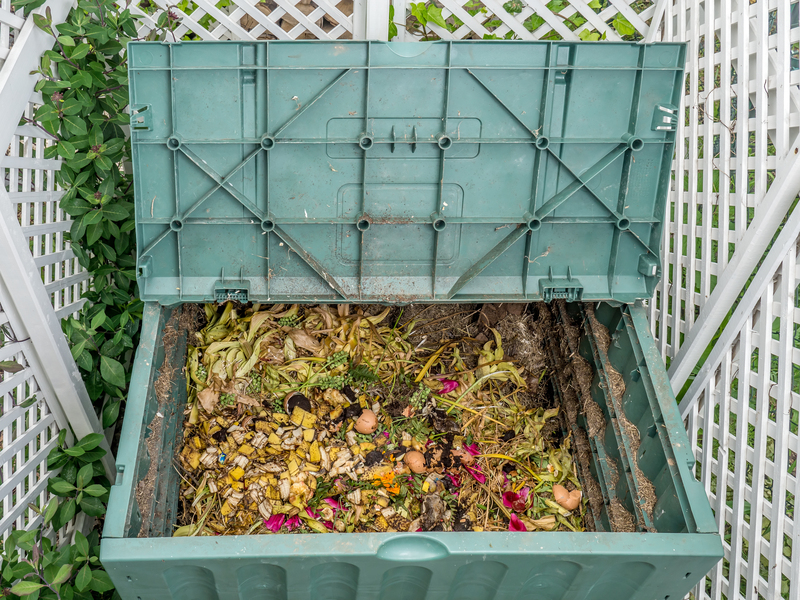Enhance Skip Hire Efficiency: Comprehensive Dos and Don'ts
Skip hire is an invaluable service for residential, commercial, and industrial clients seeking to manage waste efficiently. Whether overseeing a home renovation, a construction project, or a business clear-out, understanding how to improve skip hire efficiency makes a tremendous difference in time, cost, and environmental impact. In this comprehensive guide, we delve into actionable tips, essential dos and don'ts, best practices, and insider advice to help you get the most value from your skip hire experience.

Why Efficient Skip Hire Management Matters
Waste management is more than just disposing of rubbish. Proper practices can reduce liability, control costs, and promote sustainability. Ineffective skip utilization may result in overspending, project delays, and safety hazards. By enhancing your approach, you not only streamline the process but also contribute to responsible waste handling and recycling.
- Cost Savings: Efficient skip hire means booking the right size and volume, preventing extra charges for overfilling or multiple collections.
- Time Management: Well-planned skip usage avoids project slowdowns due to waste pile-up or waiting for additional skips.
- Safety & Compliance: Adhering to local regulations and disposing of waste responsibly reduces risks and possible fines.
- Environmental Benefits: Maximising skip usage enhances recycling and reduces landfill impact.
Top Dos for Enhancing Skip Hire Efficiency
1. Accurately Assess Your Waste Volume
Estimating the correct skip size is critical for skip hire efficiency. Underestimating leads to overflow and extra hire costs; overestimating wastes money and resources. Most skip hire companies provide size guides--consider using online calculators, discussing with your provider, or visually gauging your waste pile.
- Mini skips (2-3 cu yd): Ideal for small renovations or garden work.
- Midi skips (4-5 cu yd): Suitable for bathroom or kitchen refits.
- Builders skips (6-8 cu yd): Popular for major renovations, construction, or clear-outs.
- Maxi skips (10-16 cu yd): For large projects including office or commercial waste.
Tip: Better to slightly overestimate than to deal with overflow penalties!
2. Pre-Sort and Organise Your Waste
Segregating waste increases recycling rates and may reduce disposal costs. Most providers require separation of hazardous, recyclable, and general waste. Clearly label different waste types and avoid mixing items like electronics, plasterboard, or garden waste with household rubbish.
- Metal, paper, and certain plastics are commonly recyclable.
- Organic waste should not be mixed with construction debris.
- Ask your provider about specific rules for skip waste segregation.
3. Check Required Permits in Advance
If you plan to locate the skip on public land (e.g., a road or pavement), you must obtain a permit from your local authority. Failing to organise this can result in fines. Your skip hire company can usually arrange this for you--ask in advance and factor processing time into your plan.
4. Strategically Position Your Skip
Place your skip close to the source of waste to minimise carrying distance. Ensure it is accessible for delivery and collection trucks but doesn't block driveways, fire exits, or access for emergency vehicles. When positioning on private property, cover surfaces to prevent damage.
- Use plywood or boards to protect tarmac or paving.
- Allow space for loading bulky items efficiently into the skip.
- Consider access for neighbours and services.
5. Load Your Skip Safely and Efficiently
Optimise space by breaking down large items and flattening bulky waste. Place heavier materials at the bottom and lighter, awkward-shaped items on top. This not only maximises skip capacity but also prevents overloading, which is illegal and dangerous.
- Never exceed the fill-line.
- Layer waste to avoid air gaps.
- Stack flat items (like doors or panels) at the bottom.
Key Don'ts to Avoid in Skip Hire Efficiency
1. Don't Overfill the Skip
Exceeding the marked fill-line is unsafe--waste may fall during transport, posing hazards and incurring legal and financial penalties. Most skip hire providers will refuse collection or demand the skip be partially unloaded if overfilled.
- Plan loading to avoid stacking items high above the rim.
- Check local regulations for maximum permitted fill levels.
2. Don't Dispose of Prohibited Materials
Not all waste is suitable for skips. Items like asbestos, tyres, batteries, chemicals, fridges, TVs, and certain electronics are strictly prohibited. Mixing these into your skip can result in contamination fees, fines, or environmental hazards.
- Review the list of forbidden items from your provider.
- Arrange specialised collection for hazardous or electronic waste.
3. Don't Block Access or Cause Obstructions
Improper skip positioning can obstruct roads, pavements, driveways, or emergency access. This may lead to complaints, legal problems, or collection refusal.
- Never place skips on blind corners or bends.
- Leave clear paths for vehicles, pedestrians, and emergency personnel.
4. Don't Delay Skip Collection or Replacement
Leaving a full skip unattended risks unwanted fly-tipping or neighbour disputes. Prolonged on-site skips can attract additional charges beyond the standard hire period and may breach permit conditions.
- Arrange prompt pick-up or replacement with your provider as soon as the skip is full.
- Coordinate with project deadlines to synchronise waste collection.
5. Don't Ignore Safety Precautions
Unattended or misused skips can be a safety hazard, especially for children. Always keep the area tidy, use warning signage if necessary, and consider safety barriers if the skip is in a public space.
- Don't allow construction waste to spill onto roads or pavements.
- Protect passers-by from potential sharp or hazardous materials.
Practical Tips for Optimised Skip Hire Efficiency
Plan Ahead for Project Success
Book your skip well in advance, especially during peak seasons (spring/summer or before holidays). Factor in delivery and pick-up dates that match your project timeline and buffer for unforeseen delays.
- Communicate schedule changes promptly to your provider.
- Plan waste removal stages for phased projects, hiring multiple skips if necessary.
Communicate Clearly with the Skip Hire Company
Provide accurate information about access, waste type, permit requirements, and special needs upfront. The more detail you give, the smoother your skip hire process will be.
Maximise Recycling and Minimise Waste
Many skip hire services offer recycling solutions--take advantage! The UK and other countries increasingly legislate for recycling quotas in construction and commercial sectors. By pre-sorting and informing providers of your efforts, you may even get discounts.
- Ask for separate skips for recyclable materials, if large volumes justify it.
- Keep hazardous or restricted items clearly separate to avoid contamination.
Optimise Skip Size for Your Needs
While saving money is important, don't skimp on skip size if you anticipate bulky or unexpected waste. Rather than risk overflow or rush expensive second hires, consult experts and allow for a margin of error.
Protect Your Property and Your Neighbours
Always respect boundaries--both your own and those nearby. Secure permissions if needed, and choose the right surface (hardstanding, driveway, or road with a permit). Cover skips between uses to prevent rainwater accumulation or illegal dumping.
- Consider using tarps or nets for skip covers.
- Alert your neighbours if skip lorries may block access briefly on delivery or collection.
The Environmental Impact of Efficient Skip Hire
A key benefit of effective skip usage is lowering your environmental footprint. By following the above dos and don'ts, you help reduce waste volume headed to landfill, support local recycling initiatives, and minimise pollution.
- Less Landfill Waste: Pre-sorting and appropriate skip choice means more materials can be recycled or reused rather than dumped.
- Reduced Emissions: Efficient loading minimises the number of trips for collection, saving fuel.
- Community Cleanliness: Prompt and tidy skip use prevents illegal dumping and keeps urban spaces cleaner.

Common Questions About Efficient Skip Hire
How do I choose the right skip size?
Discuss your project in detail with the hire provider, and use visual/online guides. When in doubt, choose slightly bigger--it's usually less expensive than ordering a second skip.
What can I put in a skip?
General waste, renovation debris, soil, rubble, non-electrical furniture, and most garden waste is typically permitted. Hazardous items, electricals, and certain chemicals are not allowed. Always check with your provider.
Do I need a permit for skip hire?
Only if placing the skip on public land (street, pavement). Your skip hire company can usually handle applications, but factor in several days for approval.
How long can I keep a skip?
Standard hire periods are 1-2 weeks, but longer hires can be arranged. Exceeding agreed periods may incur extra charges. Plan collection in advance to avoid overrun fees.
Conclusion: Maximise Skip Hire Efficiency with Best Practices
Managing your skip hire project efficiently is as much about preparation as it is about execution. By understanding the vital dos and don'ts highlighted above, you not only streamline your waste removal and control costs but also ensure safety, compliance, and environmental responsibility.
- Assess waste volume carefully and book the right skip size.
- Separate and organise waste to improve recycling outcomes.
- Obtain required permits and choose optimal skip locations for access and safety.
- Never overfill or include prohibited materials to avoid fines or delays.
- Coordinate timing and clear communication with your skip hire provider for a smooth experience.
Ready to transform your waste management strategy? By following these comprehensive skip hire efficiency guidelines and best practices, you set yourself up for project success--saving time, money, and the planet in the process. Get in touch with a reputable skip hire provider today, and discover how simple, effective, and eco-friendly responsible waste disposal can be!